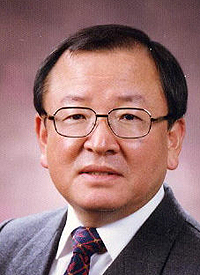Kang Man-soo, senior presidential economic adviser and former finance minister, was recommended Thursday as the next chairman of state-run KDB Financial Group Inc.
The Financial Services Commission requested President Lee Myung-bak appoint Kang to lead the group, which controls Korea Development Bank. He would double as chief of the lender.
Kang, 66, will replace Min Euoo-sung, who led the state financial firm since 2008.
 |
Kang Man-soo |
The recommendation is likely to meet criticism from opposition parities and civic groups concerned with growing government influence on the financial industry.
“With his wide knowledge and rich experience in the domestic and international economy and finance, candidate Kang is considered best fit to lead the future of the KDB Financial Group,” the commission said in a statement.
The government is seeking to forge KDB as a bona-fide investment bank to compete globally and increase the nation’s financing capacity for large-scale overseas projects.
Kang has stressed the need to invigorate investment banking as a key task to upgrade the nation’s lagging financial industry.
Korea’s financial industry faces a sweeping consolidation and market expansion.
Big-ticket mergers and acquisitions are under way, heralding major changes in the industry landscape and setting the stage for cutthroat competition for market leadership.
The government is also poised to revive policies to advance the capital market and investment banking, which were frustrated by the global financial meltdown in 2008-09.
His appointment is likely to further fuel the dispute over cronyism stoked when Euh Yoon-dae, the president’s confidant and former Korea University president, was appointed as chief of KB Financial Group last year.
Kang, thought of as Lee’s economic mentor, in February withdrew from the competition for chairman of Shinhan Financial Group for which he was the most powerful hopeful.
It has been a long-held custom in Korea for retired bureaucrats to migrate to top industry positions, taking advantage of the prowess, clout and connections they built while in office.
As Lee’s first finance minister in 2008, he exerted a controversial policy mix of interventionism and liberalization ― meddling in currency markets, pressuring business leaders to invest and hire, affording favors to conglomerates, cutting taxes for the wealthy and corporations, and drastically dismantling business regulations.
He has proved himself a fortunate survivor. Before his 2008 return to public life, Kang had been out in the cold after leaving office in the wake of the 1997 economic crisis, for which he was deemed partly responsible.
Kang resigned in February 2009 after his policies were much blamed for the foreign exchange crisis that battered the nation the previous year. But he was quickly appointed to head a presidential advisory body for industrial policies.
By Kim Yon-se (
kys@heraldcorp.com)








